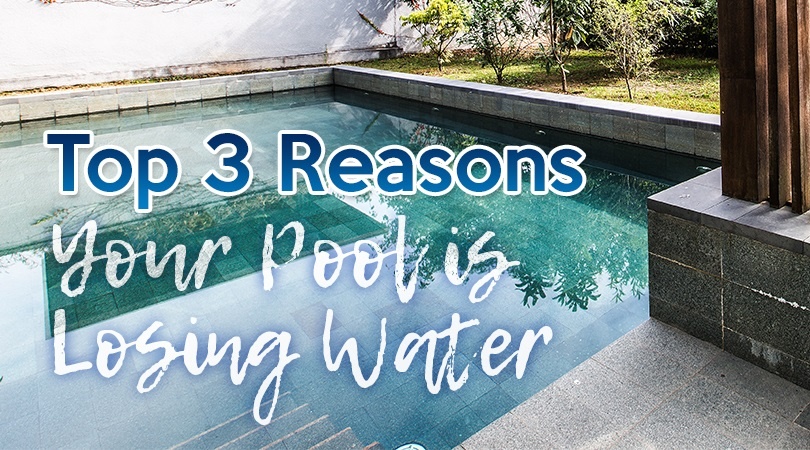
There are three primary reasons why your pool is losing water:
Leaks are the most frequent cause of water loss issues. Evaporation can be minimized but is normal. The easiest reason to avoid is excessive splashing.
Your pool will lose about a quarter of an inch a day to evaporation. Covered pools lose even less. The weather also controls evaporation. You will lose more water as vapor in dry weather than in the typically humid Florida climate.
If your pool is losing water that is more than the usual rate, try the bucket test to estimate the loss. This test also works in hot tub spas.
The warmer spa water will evaporate faster, especially in the cooler air. You may even see the steam coming from the hot tub if you are using it on a cold night. Evaporation will also take place with an indoor spa tub or pool. You will see the condensation on the walls or windows as the vapor comes into contact with the cooler surface.
The pool or hot tub cover is still the first way to control evaporation even in the indoor environment.
Always consider the possibility a leak has developed when your pool is losing water. Leaks come from different directions, but there is a process that will help you find the problem.
These are preliminary checks to determine the leak area. Take a good look at the skimmer assembly. It should be tight with the water level about two-thirds above the bottom of the assembly. If the water level is lower, it may be the result of a break in the pipe that takes in water.
You can look at the filter on the pump system and check all hoses and fittings. Water on the floor of the pump area indicates a leak in that system.
The drain is harder to check. A loose connection to that line may also be the cause of a slow leak. If you find water under the deck, check for a broken or cracked pipe in the area where water is present. Any of these problems must be fixed immediately to avoid further water loss.
Have fun in the pool but ask people not to splash or jump into the water with cannonball style entrances. Keep diving boards and water slides centered, so that splash water falls back into the pool. Keep hard objects that can tear or crack the pool's surface out of the pool.
After a hurricane, it’s important to check your pool thoroughly for storm damage. Small cracks from blowing or falling objects can lead to larger tears and damage. Caulk and reattach any loose tiles. If your pool continues to lose water, call Aquaman Leak Detection for immediate service. We will find and repair the problem in one visit.

With over 20 years of reputable experience finding leaks, owner Lowell Ball created a unique and patented leak detection system that accurately finds leaks without damaging property. We are so confident in our system and our workmanship, we offer the strongest warranty in the industry.
Aquaman Leak Detection Corporate
1275 South Patrick Dr, Suite A6
Satellite Beach, FL 32937
Owner Direct: 321.431.4784
844.766.5532 (844 POOL LEAK)
info@aquamanleakdetection.com
Office Hours:
9AM-6PM Mon-Fri
Emergency Service Available 24/7
Blog Comments